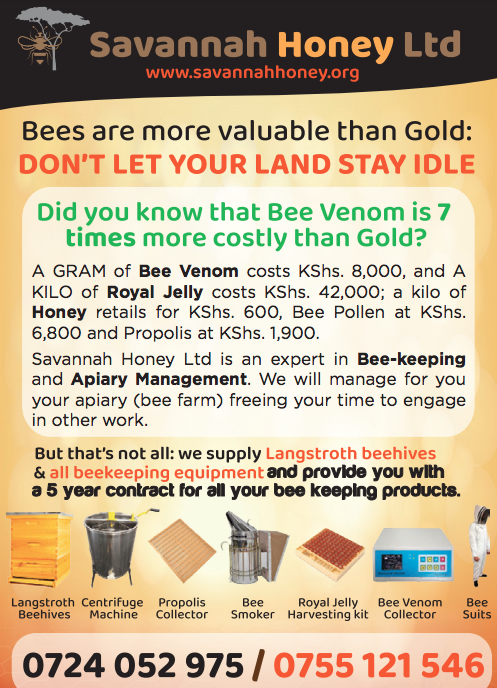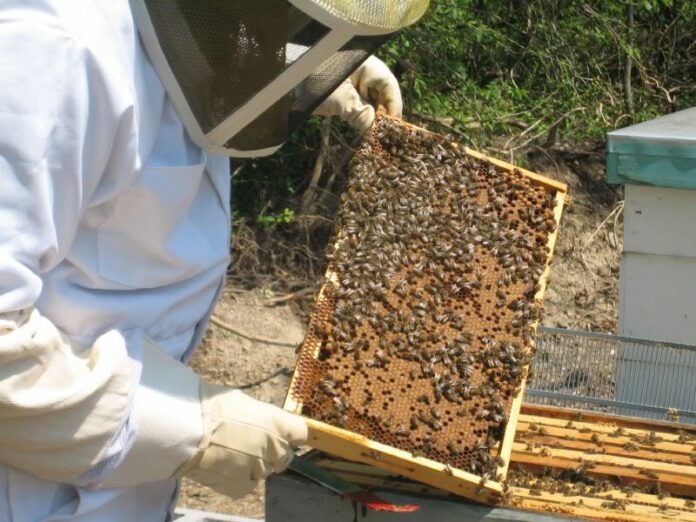Bee Keeping in Kenya: Did you know that bee venom is seven times more costly than Gold? A GRAM of Bee Venom costs KSh. 8,000. A Kilo of Propolis is Ksh. 1,800. A KILO of Royal Jelly costs KSh. 42,000. A kilo of honey currently retails for KSh. 600.
SO how an you get bee keeping in Kenya right and make money out of it? Savannah Honey is an expert in Bee keeping in Kenya as well as Apiary Management. We will manage for you your apiary (bee farm) freeing your time to engage in other work.
But that’s not all: we provide LANGSTROTH BEE HIVES (including delivery)
– Installation of the beehives on site
– The Bees (Colony Division)
– Monthly visits for Technical support (at no extra cost)
– Provide Market for the Honey, Royal Jelly, Propolis, Bee Venom, and Bee Pollen.

Savannah Honey: Honey is five times more expensive than oil and its demand is increasing not only in Africa, but all over the world. Priced at between $6-$11 (Ksh. 500 – Ksh. 1,100), one kilo of honey in Kenya costs five times what a litre of petrol does, and in the Arab market, a jar of honey can fetch almost double this amount ($15-$25).
It is a price tag that has honey producers all over the world salivating . This is according to Savannah Honey – a Kenyan social enterprise that has been involved in empowering interested beekeepers for the last seven years through offering training on modern beekeeping, provision of langstroth beehives and other beekeeping equipment, management of the apiaries, provision of the bees, technical support and, marketing of the honey.
Money in honey: How your idle land can make you millions
Since independence, Kenya has had deficit in honey production which leads to over 80 per cent of honey processed in Kenya being imported from Tanzania while there is a lot of potential for beekeeping in the country in fact, Leading honey producers in Africa such as Ethiopia, Zambia, Tanzania, Uganda and Zimbabwe have the same favourable climatic conditions for beekeeping as Kenya. There is a global shortage of honey and although Kenya has the potential to at least bridge part of it, little effort has been made in this direction.
“Bee-keeping in Kenya has been practiced traditionally for many years. However only 20 per cent of the country’s honey production potential (estimated at 100,000 metric tonnes) has been tapped” – Says Paul Kyalo CEO Savannah Honey. Many farmers in Kenya are yet to commercialize honey production as the sector is still regarded as a preserve of the poor. This has been the case while there is a huge market for the product in Europe, Asia and the Middle East.
What survey says
- Through bee keeping there is an opportunity for one to generate good money year round hence change in lifestyle.
- The country’s flora leaks every flowering season with over 80 per cent untapped nectar
- Due to poor bee keeping practice, we lack healthy and good honey hence importing to cover the gap.
- Farmers languishing in poverty due to lack of proper knowledge skills, modern hives and other essential tools for bee keeping.
- Bee keeping is a unique practice that works 100% well with other farm practices since less time is needed on management and supervision.
- Climatic condition has greatly changed sometimes with less or no rain to support crop farming which in turn is proper with bees.
- Due to lack of bee farmers, bees have migrated to cooler and safer regions like Baobab trees, our home roof tops, ceiling and chimneys making it always costly on repairs and contributing to poisoning/burning of bees making it almost an extinct move
Savannah Honey’s market observations
- The Country lies within the best climatic pattern year round which is excellent for bee keeping.
- Farmers have downed tools from non-profiting crop cultivation on harsh areas and looking for better and affordable ideas.
- Virgin tracts of our lands lie idle flourishing with plenty of mature indigenous trees with class (A) nectar
- Honey yields is low on traditional hives compared to modern langstroths which also give healthy honey in terms of handling and harvesting.
Why you should invest with Savannah Honey
Savannah Honey, is a social enterprise that has been involved in empowering interested beekeepers for the last seven years through;
-offering training on modern beekeeping,
-provision of langstroth beehives and other beekeeping equipment,
-management of the apiaries,
-provision of the bees(Colony Division),
-technical support and,
-marketing of the honey-We give the clients a 6 years contract
The Langstroth beehive uses a multi-layered structure and removable frames to encourage bees to build their hives in an orderly fashion and make it easy for bee keepers to harvest honey. The frames are designed to separate honeycombs as bees attach honeycombs to adjacent frames making it easier for bee keepers to manage the bees and honey collection effortlessly.
Savannah Honey has recruited over 4,000 farmers in East Africa and has recently launched a new program targeting 7,000 who may not necessarily have time or land for beekeeping but are interested in making money from modern beekeeping. This is a perfect programme for many people who are busy in their work in the cities and have land lying idle in the village. This also applies to people who are interested in the programme but lack land. Savannah Honey will lease land for them to undertake the enterprise. Through this programme,the interested clients upon purchasing the beekeeping equipment will have Savannah honey managing the apiaries and the entire enterprise for them and buy the honey after the harvest.










